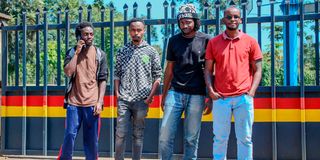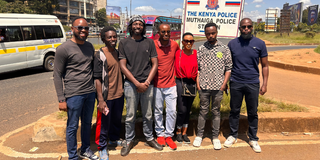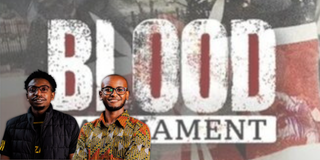Premium
Filmmakers released after night arrest were quizzed on BBC ‘Blood Parliament’ story, says lawyer

From left: Filmmakers linked to BBC Blood Parliament documentary Nicholas Wambugu Gichuki, Chris Wamae, Brian Adagala and MarkDenver Karubiu at Muthaiga Police Station in Nairobi after being released from custody on May 3, 2025.
What you need to know:
- Arrests after BBC film exposes killings during 2024 anti-tax protests
- Charges include 'false information' and 'cyberbullying
- Creatives, activists condemn move as attack on press freedom
The lawyer of four Kenyan filmmakers arrested on Friday night only to be released without charge on Saturday morning has accused the police of forcing his clients to sign statements without legal representation and confiscating their equipment without following due process.
Mr Ian Mutiso also claimed that the arrest and interrogation were based on a misguided attempt to link the four to the BBC Africa Eye documentary, Blood Parliament, which aired recently and sparked significant public interest.
Nicholas Gichuki, Brian Adagala, MarkDenver Karubiu and Chris Wamae were arrested on Friday night and held at Pangani and Muthaiga police stations, with the lawyer now claiming that the line of questioning of his clients by the police later revealed they wanted to pin them over BBC Africa Eye's 40-minute documentary, Blood Parliament.

Filmmakers Nicholas Gichuki, Brian Adagala, MarkDenver Karubiu and Chris Wamae with LSK lawyer Ian Mutiso shortly after their release.
The damning exposé, which aired earlier this week, identifies several security officers, who were alleged to have shot dead at least three unarmed protesters.
“Upon reviewing the Occurrence Book (OB), it became clear that the police intended to charge them with the publication of false information. Additionally, it emerged that the police confiscated their gadgets through what appears to be a misleading court application, without proper authorization,” Mr Mutiso told the Nation.
“However, it also became evident that the individuals were interrogated under coercive circumstances. They were reportedly forced to sign statements, and the line of questioning suggested that the authorities were trying to link them to the BBC documentary aired recently,” he added.
This came as the BBC on Saturday said the four filmmakers were not involved in the making of the documentary.
“We have been made aware of the arrest of four journalists in Kenya. To confirm, they were not involved in any way in the making of BBC Africa Eye’s Blood Parliament documentary,” the BBC Press Office said in a statement.
Mr Mutiso said he was initially told that none of the four were in Pangani, but later, under pressure, police confirmed that Nicholas and Brian were indeed there. He then went to Muthaiga where he was told the other two, Mark Denver and Chris Wamae, were being held.
The BBC film has attracted international attention for its graphic depiction of state violence and its efforts to hold perpetrators to account.
Mr Mutiso stated that two of the filmmakers, Mark and Brian are videographers who often work together but were not involved in the BBC documentary.
Despite this, the police allegedly confiscated their gadgets through a misleading court application and sought to frame them as contributors to the film.
Mr Mutiso told journalists outside Muthaiga Police Station that he will pursue charges against the police for the arrest and for the confiscation of video and other equipment.
“Thanks to strong collaboration between media houses and the Kenya Law Society of Kenya, all four were eventually released on a free bond. As their legal representatives, we plan to challenge the illegal seizure of their electronic devices. We aim to file a court application as early as Monday to: Halt any further unauthorized use of the confiscated evidence and Compel the authorities to return the journalists’ gadgets,” he said.
Nicholas thanked Kenyans on social media and his family for standing in solidarity with them.
“We thank all of you who sent messages about our arrest on all social media platforms,” he said.
This, as editors, civil society activists and the Kenya Film and Television Professionals Association (KFTPA) condemned the arrests, saying it was a serious affront on the freedom of the media—and on World Press Freedom Day, marked on May 3, no less!
“It is deeply troubling that even as we commemorate this day, we are witnessing an escalation in actions that threaten media freedom and the safety of journalists in Kenya. We strongly condemn the recent arrest of journalists, including a freelance team that worked with the British Broadcasting Corporation (BBC) and the arrest of a journalist in Kati,” said Zubeidah Kananu, the Kenya Editors Guild (KEG) President.
The guild noted that any attempt to intimidate, silence, or punish journalists for doing their work is an affront to democracy and the Constitution of Kenya, which guarantees freedom of expression and media independence.
“We must be unequivocal: journalism is not a crime. The media serves the public interest and must be allowed to operate without fear or favor. Any attempt to Statement on arrest of Journalists, intimidate, silence, or punish journalists for doing their work is an affront to democracy and the Constitution of Kenya, which guarantees freedom of expression and media independence,” said Ms Kananu.
They further condemned the arrest of the journalists and called on the government to step up and protect Press Freedom noting that freedom of the media and freedom of expression must be guarded at all costs, and journalists protected from rogue security apparatus.
“We call on the government to step up and protect Press Freedom, noting that campaigns ahead of the 2027 elections have pre-maturely began. Freedom of the media and freedom of expression must be guarded at all costs, and journalists protected from rogue security apparatus. We call upon the government to uphold its constitutional duty to protect journalists and respect the independence of the media. We also urge all media practitioners to remain steadfast in their duty to seek the truth and speak it boldly,” said Ms Kananu.
The Police Reforms Working Group-Kenya (PRWG-Kenya), a conglomerate of civil society groups, condemned the arrest of four independent film producers and criticized the government’s approach to governance, citing failures in the economy, the health sector, and what they termed the scapegoating of critics
“While the four film producers have since been released on free bond, we call on the Directorate of Criminal Investigations to drop the charges of 'false publication' against the four and release their equipment to them,” the group said.
They went on: "We call on the National Police Services to concentrate its vast investigative resources on finding and charging the Kenya Defence Services and Police officers that have been identified in the BBC Blood Parliament documentary as suspected to have killed Ericcson Mutisya, David Chege, Eric Shieni, and the other 60 protesters. This is where the public interest lies.”
At the same time, the Civic Freedoms Forum (CFF) condemned the arrest and detention of four Kenyan filmmakers terming the arrests as unlawful and a violation of their constitutional rights, carried out without disclosed warrants or formal charges.
The forum criticized the Directorate of Criminal Investigations (DCI) for conducting the arrests during odd hours, saying it was a calculated move to intimidate dissenting voices.
“These detentions, carried out without publicly disclosed warrants or formal charges, exemplify the erosion of media freedoms and the misuse of law enforcement to intimidate truth-tellers. Why would the DCI make arrests during unholy hours without disclosed warrants or formal charges? Why Would the Government make unlawful arrests two days after committing to the whole world during the Universal Periodic Review in Geneva that it will protect human rights and freedoms of everyone?” said the group.
The Forum demanded that the DCI account for the legal basis of the arrests, return all confiscated equipment and phones, and called for investigations by the Kenya National Commission on Human Rights and Parliament’s Committee on Information and Communication Technology.
“This incident is not an isolated overreach - it is a chilling warning to all journalists, filmmakers, and civil society actors who dare to challenge entrenched power. We must not allow intimidation to eclipse truth, or authoritarianism to replace accountability. We call upon DCI to publicly account for the legal basis of the arrests and the conduct of involved officers and to release the equipment, all phones and any other materials confiscated by the police, “it said.

Arrested filmmakers Nicholas Gichuki, Brian Adagala being held at Pangani police station, lawyer Ian Mutiso says; MarkDenver Karubiu and Chris Wamae at Muthaiga station.
The Kenya Film and Television Professionals Association (KFTPA) chairman Ezekiel Onyango said “the criminalisation of filmmakers for carrying out their work is unacceptable.”
“We have been informed that they are facing charges related to publishing false information and cyberbullying, and we call on the relevant authorities to provide full transparency regarding these charges and the conditions under which the filmmakers are being held,” he said.
KFTPA further called for full transparency from the relevant authorities regarding the nature of these charges, the evidence presented, and the conditions under which the filmmakers are being detained.
On Monday, Kenyan officials blocked a public screening of the documentary in what many see as an attempt to silence the investigation and prevent further scrutiny. The BBC confirmed that the screening was abruptly cancelled after local authorities intervened.
“The screening was stopped at the last minute under pressure from the government,” the BBC said in a statement.


